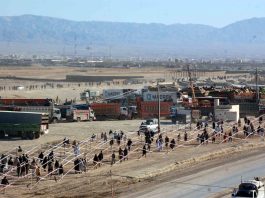Peshawar: Hamid Shah, a student of grade 6 in a private school in Peshawar, has lately been distracted. He is present in the class but not focused on his studies. That worries his teacher because Shah is among the top students of the class.
“Since the attacks on education institutions, we have noticed a visible change not only in his attitude but other students as well,” said Maryam Khan, who teaches physics at Hamid’s school. “He seems nervous and lost. His performance in studies has declined.”
First it was the terrorist attack on the Army Public School in Peshawar in December 2014. The attack left 140 children dead. It shocked the nation and was widely covered by media that beamed grisly images of the massacre into homes where scared children watched and discussed them with worried parents. After the attack, and warning from terrorists that such attacks would be repeated, the schools stayed close for some time. Parents were afraid to send their children to schools. The schools reopened, but not before taking security measures. Teachers were allowed to bring in guns for protection and were trained by the police in handling firearms.
And then the attack happened again. In January 2016, the Bacha Khan University (BKU) in Charssada, a town in Khyber Pakhtunkhwa province, terrorists entered the university, killing 21 students. In a chilling video-taped warning, the same terrorists that had attacked APS and now BKU, warned of more such attacks. In the wake of the attacks, schools remained close for days, fear and uncertainty stalking the students, the parents and the teachers.
Even as the schools have reopened, the children that have witnessed the concerns and conversations spurred by media coverage of the attacks are becoming increasingly preoccupied with how they will respond in case of an attack on their school. “The students seem worried; they talk all the time about how they will escape a terrorist attack if it happens,” said Maryam Khan. “Their conversation focuses on terrorism instead of normal healthy activities like studies and sports.”
Many students whom teachers view as brilliant students are suffering from stress in the wake of attacks on educational institutions. So are their classmates.
According to Shahzaib Khan, a principal at a private school in Peshawar, even when students returned to schools after a long break following attack on APS, the attendance rate was low as parents were reluctant to send kids to schools. However, with the passage of time, parents gradually started sending children to schools and they returned to routine academic activities. But after the attack on the BKU, says Shahzaib, fear and anxiety among parents, children and teachers is rampant, just as it was after the opening of education institutions following the attack on APS.
“Seeing changes in the environment of their school like walls being raised with barbed wires on them, deployment of guards, checking bags of students entering the school premises heightens fears about safety,” says Shahzaib Khan. “The students – and teachers – have now come to have a very different view of education institutions as places that are not safe.”
Adding to the children’s anxiety are the mock safety drills at education institutions that have been frequently held after attacks on APS and BKU. “Conducting safety drills involving children has further increased stress among students, taking their focus away from studies,” says Shahzaib Khan.
In the wake of attack on BKU, the anxiety among parents and students runs deeper than it did in case of APS even when the number of deaths was higher back then. “The reason is after the BKU incident, people have realized that education institutions are now a specific target of terrorists,” says Shahzaib Khan.
In January, in a meeting at Malik Saad Police Lines with principals and owners of private and government schools in the city, a senior police officer Abbas Majeed Marwat told participants that the strength of the provincial police was 68,000 whereas there were 64,000 educational institutions across the province. He said education institutions would have to make arrangements to protect themselves because a deficient police force cannot cater to the security needs of every institution. The institutions, he said, would have to upgrade security arrangements, including arming teachers for self defence.
But Shahzaib Khan, the school principal, considers arming school teachers for self-protection as imprudent. “It should never be allowed as it would have a negative impact on students seeing their teacher carry arms in the class.”
However, Shabana, a teacher at a school in Peshawar, is of the view that it should be allowed after proper training in weapon handling and with the condition of minimum display on the premises of school.
Psychologists say that children who have suffered Post Traumatic Stress Disorder (PTSD) are likely to display symptoms of depression and aggression.
“There are two types of disasters people can experience in life – natural disasters and man-made disasters,” Dr. Romana Zaib, a lecturer at the Psychology Department in Peshawar University, told News Lens. “Effects of man-made disasters are difficult to cure for any psychologist, as is the case with students affected by attacks. The reason is their age that makes them timid.”
Zaib said most schools have stopped or restricted extracurricular activity in and out of school at a time when it was needed most. “The schools should continue extracurricular activities at least within the school premises to keep students psychologically fit,” she said.
Zaib said security arrangements taken at schools like fixing barbed wires on walls, checking students’ bags and allowing teachers to carry guns would undermine the mental health and outlook of students.
However, the security situation being what it is, such arrangements are unavoidable, as are their negative effects on students, said Romana Zaib. Having security arrangements in place, she said, would at least make children and parents confident that they exist for the safety of students.
“The government should arrange psychotherapy workshops for students and teachers to overcome anxiety,” said Zaib. “Schools should arrange workshops on their own while having a psychologist available at school to help students and teachers deal with fear and depression.”



